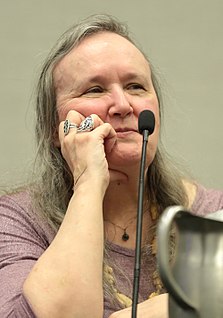Top 428 Texts Quotes & Sayings - Page 8
Explore popular Texts quotes.
Last updated on April 20, 2025.
When the devil makes his offer (always open incidentally) of the kingdoms of the earth, it is the bordellos which glow so alluringly to most of us, not the banks and the counting-houses and the snow-swept corridors of power . . . Sex is the mysticism of a materialistic society - in the beginning was the Flesh, and the Flesh became Word; with its own mysteries - this is my birth pill; swallow it in remembrance of me! - and its own sacred texts and scriptures - the erotica which fall like black atomic rain on the just and unjust alike, drenching us, stupefying us. To be carnally minded is life!
Sacred Scripture, since it has no science above itself, can dispute with one who denies its principles only if the opponent admits some at least of the truths obtained through divine revelation; thus we can argue with heretics from texts in Holy Writ, and against those who deny one article of faith we can argue from another. If our opponent believes nothing of divine revelation, there is no longer any means of proving the articles of faith by reasoning, but only of answering his objections - if he has any - against faith.
It must be that when God speaketh, he should communicate, not one thing, but all things; should fill the world with his voice; should scatter forth light, nature, time, souls, from the centre of the present thought; and new date and new create the whole.Whenever a mind is simple and receives a divine wisdom, old things pass away, - means, teachers, texts, temples fall; it lives now, and absorbs past and future into the present hour. All things are made sacred by relation to it,-one as much as another. All things are disolved to ther center by thier cause.
Quotes are like prompts. A way of searching, connecting the dots. Other people's thinking has always - both positively and negatively - jumpstarted my thinking. Quotes are also a way of acting out not just a text, and not just thinking, but the making of a text. The construction of thinking. The quotes are part of those constructions and reflections. Thinking through quotes, which to say scouring a range of texts for insight, is one way to outline the process of thinking/feeling through a subject.
Let's consider: at the time of the Buddha, when he attained enlightenment, according to the old texts, in the first watch of the night, he went through all of his past lifetimes. Then in the second watch of the night, his mind opened still further and encompassed the coming into being and dying and re-coming into being of all beings, everywhere. The third watch of the night, he realized interdependent origination. He realized interdependent origination because he saw it. It wasn't some theory he thought up. He saw it. That was his enlightenment experience. That was why he was a Buddha.
The trouble today is that many Christians live in a kind of bubble of assumptions about what their Christianity means, especially if it places them comfortably among "the good guys," - assumptions that are likely to be drawn as much from folk-Christianity, surrounding political culture, popular pulp-books about the "End Times," or their favourite guru writer or therapist, than from sober and comprehensive reading of the Bible as a whole. Prophets and preachers have the unwelcome task of pricking that bubble with the sharpness of actual texts and teachings of the Bible itself.
Mister Cameron - I have read the unexpurgated Ovid, the love poems of Sappho, the Decameron in the original, and a great many texts in Greek and Latin histories that were not though fit for proper gentlemen to read, much less proper ladies. I know in precise detail what Caligula did to, and with, his sisters, and I can quote it to you in Latin or in my own translation if you wish. I am interested in historical truth, and truth in history is often unpleasant and distasteful to those of fine sensibility. I frankly doubt that you will produce anything to shock me.
The Bible became the book of books, but it is not one document. It is a mystical library of interwoven texts by unknown authors who wrote and edited at different times with widely divergent aims. This sacred work of so many epochs and so many hands contains some facts of provable history, some stories of unprovable myth, some poetry of soaring beauty, and many passages of unintelligible, perhaps coded, perhaps simply mistranslated, mystery. Most of it is written not to recount events but to promote a higher truth—the relationship of one people and their God.







